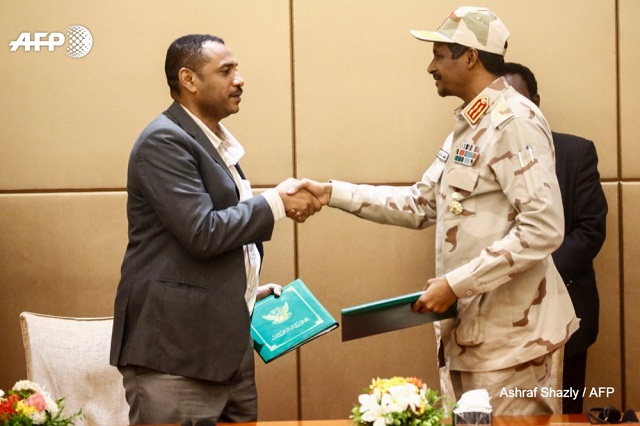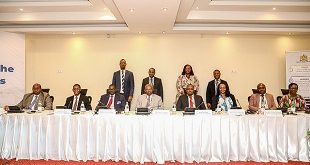
Khartoum, Sudan | AFP | Veteran Sudanese leader Omar al-Bashir ruled the northeast African country for three decades with an iron fist. Now Sudan is turning the page, ushering in a new era of civilian rule.
A constitutional declaration, signed on Sunday between the ruling generals and the leaders of an unprecedented protest movement, sets out the framework for a transitional leadership and builds on a landmark power-sharing deal initialled on July 17.
It outlines the formation of a transitional civilian government and a parliament to govern for a three-year transition period under the supervision of a joint civilian-military ruling body
After more than seven months of demonstrations and violence, the pact was welcomed domestically and internationally and will be formally signed on August 17 in the presence of foreign dignitaries.
The next day, the composition of the new transitional civilian-majority ruling council will be announced.
A prime minister will be named on August 20 and cabinet members on August 28.
The sovereign council and the cabinet will meet for the first time on September 1.
– Key points –
Sudan’s transitional period will last 39 months from the signing of the constitutional declaration. At the end of the transitional period elections will be held.
Bringing peace among Sudanese factions in conflict-ridden regions is a priority during the first six months of the transitional period.
The transitional government is to work on drawing up legal and economic reforms as well as outlining a balanced foreign policy.
The ruling sovereign council will be composed of 11 members including six civilians and five from the military. It will be headed by a general for the first 21 months, and afterwards by a civilian for 18 months.
The council will oversee the formation of a transitional civilian administration including a cabinet and a legislative body.
The prime minister shall be nominated by the umbrella group of the protest movement, the Alliance for Freedom and Change, and confirmed by the sovereign ruling council.
The cabinet shall be comprised of no more than 20 ministers to be picked by the premier from the nominees put forward by the alliance.
But this does not include the interior and defence ministers who shall be chosen by the military members of the sovereign council.
The legislative body should be formed within 90 days from the signing of the deal.
It should comprise no more than 300 people and 40 percent of the seats should be allocated to women.
The alliance shall have 67 percent of the seats and the remaining 33 percent shall be for other political parties, not linked to Bashir.
Sudan’s armed forces and the paramilitary Rapid Support Forces, which have been widely blamed for a deadly crackdown on a weeks-long sit-in in June, are part of the military institution under the command of the head of the armed forces.
The respective laws and regulations of the armed forces and the RSF — which emerged out of the feared Janjaweed militia — shall regulate the military institution’s relationship with the executive authority.
The renamed General Intelligence Services is a regulatory body, concerned with gathering, analysing and presenting information to the relevant authorities.
The intelligence agency falls under the executive authority and the sovereign council.
– Rights and Freedoms –
Under the declaration, every citizen has a right to freedom and security and no one shall be subject to arbitrary arrest excepted in accordance with the law.
Every person has the right to freedom of religious belief.
Every citizen has the right to freedom of expression, spreading information, and access to the press.
Internet access provided it does not interfere with the country’s order, security and public ethics is a right.
The right to peaceful assembly is guaranteed. Every person holds the right to form and/or join political parties, associations, syndicates, and professional unions.
 The Independent Uganda: You get the Truth we Pay the Price
The Independent Uganda: You get the Truth we Pay the Price



